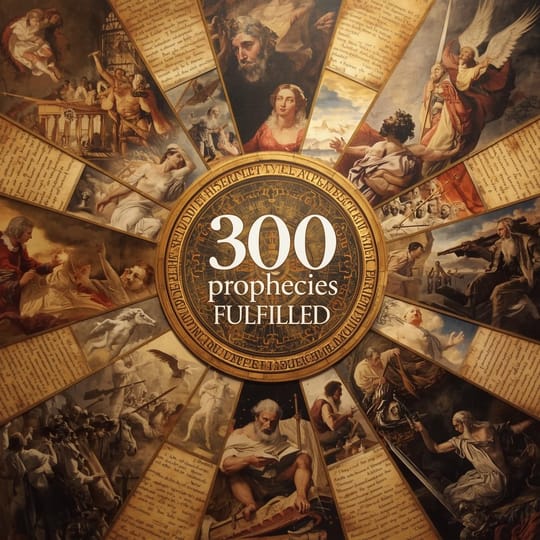Question: Who/What is the Holy Spirit?
Answer: Simply put: He is God. There is no way we can put all of God into a single blog post, but we can start a conversation.
Let's get into it.
(These are the notes from a session at RLC on the topic of the Holy Spirit, 2025)
Section One: Why is This Subject Important?
Bottom Line: This subject is essential because, even though it should unite the Church, it divides entire denominations.
- The topic of the Holy Spirit is the dividing line between many denominations.
- People have taken subjective experience and made it an objective truth.
- People believe many things that are not in the Bible.
- People misinterpret the book of Acts. (Not all is prescriptive.)
- People are divided on how the Holy Spirit fills our lives. (All or stages.)
The Holy Spirit is our HELPER.
(John 14:16-17) (John 14:16-17) And I will ask the Father, and he will give you another Advocate who will never leave you. He is the Holy Spirit, who leads into all truth. The world cannot receive him, because it isn’t looking for him and doesn’t recognize him. But you know him, because he lives with you now and will be with you later.
The Holy Spirit EMPOWERS us.
(Acts 1:8) But you will receive power when the Holy Spirit comes upon you. And you will be my witnesses, telling people about me everywhere—in Jerusalem, throughout Judea, in Samaria, and to the ends of the earth.
The Holy Spirit is how we KNOW we belong to Christ.
(Romans 8:9) But you are not controlled by your sinful nature. You are controlled by the Spirit if you have the Spirit of God living in you. (And remember that those who do not have the Spirit of Christ living in them do not belong to him at all.)
The Holy Spirit CHANGES us.
(Galatians 5:22-23) But the Holy Spirit produces this kind of fruit in our lives: love, joy, peace, patience, kindness, goodness, faithfulness, gentleness, and self-control. There is no law against these things!
The Holy Spirit SEALS (proof) our salvation.
(Ephesians 1:13-14) And now you Gentiles have also heard the truth, the Good News that God saves you. And when you believed in Christ, he identified you as his own by giving you the Holy Spirit, whom he promised long ago. The Spirit is God’s guarantee that he will give us the inheritance he promised and that he has purchased us to be his own people. He did this so we would praise and glorify him.
Section Two: Who is the Holy Spirit?
Bottom Line: The Spirit is not a power we “use,” He is the third Person of the Trinity who empowers us. He is in control, not us.
The Holy Spirit is the 3rd part of the Trinity: God the Father, God the Son, God the Holy Spirit. He is co-eternal, co-equal, and co-omni along with the Father and Son.
- The Holy Spirit is NOT a force or simply a feeling. He is God.
- He shows up in Genesis 1 and is there in Revelation 22.
It is a gross oversimplification, but you could say the Holy Spirit is the part of God we “feel.”
The Holy Spirit is personal.
He speaks, teaches, comforts, and guides us through life.
(John 16:13-14) When the Spirit of truth comes, he will guide you into all truth. He will not speak on his own but will tell you what he has heard. He will tell you about the future. He will bring me glory by telling you whatever he receives from me.
Section Three: What the Holy Spirit Does (His Work)?
Bottom Line: The Holy Spirit is active in every aspect of our daily lives, from salvation to glorification.
1- The Holy Spirit DRAWS us to salvation.
(John 3: 5-6) Jesus replied, “I assure you, no one can enter the Kingdom of God without being born of water and the Spirit. Humans can reproduce only human life, but the Holy Spirit gives birth to spiritual life.
2- The Holy Spirit SEALS us.
(Ephesians 1:13-14) And now you Gentiles have also heard the truth, the Good News that God saves you. And when you believed in Christ, he identified you as his own by giving you the Holy Spirit, whom he promised long ago. The Spirit is God’s guarantee that he will give us the inheritance he promised and that he has purchased us to be his own people. He did this so we would praise and glorify him.
3- The Holy Spirit TRANSFORMS us as we grow in our fellowship with Him.
(Galatians 5:16-23) So I say, let the Holy Spirit guide your lives. Then you won’t be doing what your sinful nature craves. The sinful nature wants to do evil, which is just the opposite of what the Spirit wants… But the Holy Spirit produces this kind of fruit in our lives: love, joy, peace, patience, kindness, goodness, faithfulness, gentleness, and self-control. There is no law against these things!
Fruit of the Spirit.
- Love — Unselfish, sacrificial care for others that seeks their highest good (1 Cor 13:4–7).
- Joy — A deep, abiding gladness rooted in God’s presence and promises, not in circumstances (Philippians 4:4).
- Peace — Inner calm and wholeness from trusting God, even in trials (Jn 14:27).
- Patience — The ability to endure difficulties, delays, and offenses without complaining or losing self-control (Colossians 3:12).
- Kindness — A gentle, generous spirit that seeks to bless and uplift others (Eph 4:32).
- Goodness — Moral integrity and a desire to live righteously, reflecting God’s character (Ro 15:14).
- Faithfulness — Steadfast loyalty and reliability in relationships and in following God (Lam 3:22–23).
- Gentleness — Humility and tenderness in dealing with others, showing strength under control (Philip 4:5).
- Self-Control — Mastery over desires, emotions, and actions, choosing God’s will over impulses (Titus 2:11–12).
4- The Holy Spirit EMPOWERS us.
(Acts 1:8) But you will receive power when the Holy Spirit comes upon you. And you will be my witnesses, telling people about me everywhere—in Jerusalem, throughout Judea, in Samaria, and to the ends of the earth.
The gifts of the Spirit. (Total mentioned= 25)
From Romans 12:6–8
- Prophecy — Speaking God’s truth with clarity to encourage, warn, or edify.
- Serving / Ministry — Meeting practical needs and helping others selflessly.
- Teaching — Explaining God’s Word clearly and accurately so others can understand.
- Exhortation / Encouragement — Inspiring and challenging others toward spiritual growth.
- Giving — Contributing generously and wisely to meet needs and advance God’s kingdom.
- Leadership / Administration — Guiding, organizing, and directing others toward God’s purposes.
- Mercy — Showing compassion and empathy, especially toward the hurting and marginalized.
From 1 Corinthians 12:4–11, 28
- Word of Wisdom — Supernatural insight to apply God’s truth to life’s situations.
- Word of Knowledge — Special understanding of God’s mysteries or hidden truths.
- Faith — Exceptional confidence in God’s power and promises beyond normal belief.
- Healing — God-given ability to restore physical, emotional, or spiritual health.
- Miracles — Performing supernatural acts beyond natural explanation to glorify God.
- Prophecy — Spirit-empowered proclamation of God’s message to His people.
- Discernment of Spirits — Recognizing whether something is from the Holy Spirit, human spirit, or demonic influence.
- Tongues — Speaking in a language unknown to the speaker, often for prayer or worship.
- Interpretation of Tongues — Understanding and communicating the meaning of tongues so others are edified.
- Helps / Service — Strengthening, supporting, and assisting others in tangible ways.
- Administration — Organizing, planning, and guiding the church effectively.
From Ephesians 4:11
- Apostle — A “sent one” who pioneers new works, establishes churches, and provides spiritual oversight.
- Prophet — Declares God’s Word, calling people to repentance, encouragement, and alignment with His purposes.
- Evangelist — Gifted to share the gospel effectively and inspire others to do the same.
- Pastor / Shepherd — Cares for, guides, and protects the spiritual well-being of God’s people.
- Teacher — Explains Scripture in a way that promotes understanding and growth.
From 1 Peter 4:10–11
- Speaking — Proclaiming God’s truth faithfully through teaching, preaching, or exhortation.
- Serving — Using one’s abilities to meet needs and demonstrate God’s love practically.
Section Four: How Do I Walk With the Holy Spirit?
Bottom Line: When you grow in your fellowship with the Lord, you are growing in your fellowship with the Holy Spirit.
1. Reading the Bible daily.
As we come to know God more, we know the Spirit of God more.
(2 Timothy 3:16) All Scripture is inspired by God and is useful to teach us what is true and to make us realize what is wrong in our lives. It corrects us when we are wrong and teaches us to do what is right.
2. Daily prayer and worship.
(Ephesians 6:18) Pray in the Spirit at all times and on every occasion. Stay alert and be persistent in your prayers for all believers everywhere.
3- Ask the Holy Spirit to transform you every day. (Grow in the fruit.)
(2 Corinthians 3:18) The Lord—who is the Spirit—makes us more and more like him as we are changed into his glorious image.
4. Get involved in serving others and ask the Holy Spirit to empower you.
(1 Peter 4:10–11)God has given each of you a gift from his great variety of spiritual gifts. Use them well to serve one another. Do it with all the strength and energy that God supplies.
Section Five: Q&A?
1. Is the Holy Spirit “lesser” than the Father and Son? (Is He a force?)
- Answer: No. The Holy Spirit is the 3rd part of the Triune Godhead. The Council of Constantinople in 381AD confirmed the Deity of the Holy Spirit. He is just as much God as the Father and Son.
2. What is the role of the Holy Spirit in salvation?
- Answer: The Holy Spirit is the one who draws our hearts to salvation. The Father has the plan, the Son is the sacrifice, and the Holy Spirit draws us to salvation. (quick generalities)
3. Is it Holy Ghost or Holy Spirit?
- Answer: Does not matter. In the Old Testament, the word for spirit is רוּחַ (ruach). This means wind or breath.
4. What does it mean to be “filled with the Spirit?”
- Answer: This happens upon salvation. It is the moment that the Holy Spirit comes to live within us. There are various divisions concerning what it is to experience the fullness of the Spirit, but no one denies the initial filling of the Spirit upon salvation.
5. Do Christians receive the Holy Spirit at salvation or later?
- Answer: Yes and yes. We are to be continually filled with the Spirit.
6. What about Speaking in Tongues? Do you know if it is for today?
- Answer: We know that the gift of the Spirit called "speaking with other tongues" is the gift of speaking in other known languages. The goal of this, according to Acts 2, is to spread the good news of the Gospel. However, many also testify to a private prayer language where they speak mysteries to God. The theological grounding for this is not as solid as the gift of tongues. However, it is a form of worship that is not intended to be anything other than a form of worship. This gift should not be hindered or become an obsession. Whether or not you speak in tongues is not a sign of maturity as a follower of Christ. It is A gift but not the ONLY gift.
7. How do I get my spiritual gift?
- Answer: The gifts of the Spirit are given by the Spirit for His own purposes. It is not suitable for a Christian to hyper-fixate on gifts. Focus on the Giver of the gifts and allow Him to do as He pleases. Yes, 1 Corinthians says to desire the gifts. However, when taken in context, we see Paul is saying desire them so we can be of service to the church body. This should be our focus.
8. What if I don’t want a spiritual gift?
- Answer: That is okay. Your goal is to desire fellowship with the Lord. Allow Him to choose what He does.
9. Will the Holy Spirit make me weird?
- Answer: No. The Holy Spirit is not weird. If you are saved, you already have the Holy Spirit living and working in you. Weird people were weird before they got saved. God doesn't do that.
10. Does the Holy Spirit speak to me audibly, the way some say?
- Answer: This is a subjective question. Some say they hear God speaking audibly to them. Some say this is impossible. The vital thing to do is to focus on what we know. We know God speaks through His Word. Allow God to speak to you through His Word and trust God with the rest. If you ever do hear an audible voice and wonder what to do, see if it aligns with God's Word. That is the first test of truth.
11. What does it mean to grieve or quench the Holy Spirit?
- Answer: This happens when we knowingly sin.
12. Should the gifts of the Spirit be able to direct the church services, or should there be order? (1 Corinthians 14)
- Answer: There should be order. Throughout the Bible, we see that God establishes order. Look at creation. It is a beautiful symbol of order. In Ephesians 4, God establishes authority and order in the church. In 1 Corinthians 14, He establishes proper order in church services. To want to "just go with the flow" is not how God designed His church.
Section Six: Resources
Keener, Craig S. Gift and Giver: The Holy Spirit for Today. Grand Rapids, MI: Baker Academic, 2001.
Carson, D. A. Showing the Spirit: A Theological Exposition of 1 Corinthians 12–14. Grand Rapids, MI: Baker Academic, 1987.
Stott, John R. W. Baptism and Fullness: The Work of the Holy Spirit Today. Downers Grove, IL: InterVarsity Press, 2006.
Chan, Francis. Forgotten God. Colorado Springs, CO: David C. Cook, 2009.
Packer, J. I. Keep in Step with the Spirit: Finding Fullness in Our Walk with God. Grand Rapids, MI: Baker Books, 2005.
Fee, Gordon D. God’s Empowering Presence: The Holy Spirit in the Letters of Paul. Peabody, MA: Hendrickson Publishers, 1994.
Cole, Graham A. He Who Gives Life: The Doctrine of the Holy Spirit. Wheaton, IL: Crossway, 2007.
Owen, John. The Holy Spirit: His Gifts and Power. Edited by R. J. K. Law. Carlisle, PA: Banner of Truth, 1998.









